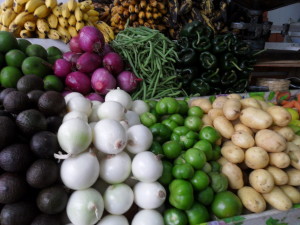By Nicola Cucuiet and Sylvia Klinger
Man y people choose a vegetarian life style for many reasons, such as health, environmental, and/or ethical reasons. Vegetarians do not eat meat, fish, or poultry. Vegans, in addition to being vegetarian, do not use other animal products and sometimes even by-products such as eggs, dairy products, honey, leather, fur, silk, wool, cosmetics, and products derived from animal products.
y people choose a vegetarian life style for many reasons, such as health, environmental, and/or ethical reasons. Vegetarians do not eat meat, fish, or poultry. Vegans, in addition to being vegetarian, do not use other animal products and sometimes even by-products such as eggs, dairy products, honey, leather, fur, silk, wool, cosmetics, and products derived from animal products.
For a successful vegan and vegetarian diet, the key is variety: include plenty of fruits and vegetables, plenty of leafy greens, whole grain products, nuts, seeds, and legumes. When committing to a vegetarian diet, some nutrients like zinc, calcium, vitamin D and vitamin B12 can be insufficiently provided . Let’s explore how to get enough of these important nutrients:
Protein
Amino acids are found in animal sources such as meats, milk, fish and eggs. Plant proteins are seen as being inferior to animal protein because of their incompete content in essential amino acids. Vegetarians and vegans can get enough essential amino acids by combining plant protein from vegetables with protein from whole grains. For an optimal essential amino acids intake, a meal should contain vegetables and grains at same time, like rice and peas or beans; pasta with beans or peas; couscous with chickpeas or lentil. The protein needs of a vegetarian are the same as for a non-vegetarian, but because of the slightly inferior quality of plant protein, the quantity should be bigger in order to cover all the essential amino acids.
Iron
Iron is an essential nutrient because it is a central part of hemoglobin, which carries oxygen in the blood. Iron is found in food in two forms: heme and non-heme iron. Heme iron, which makes up 40% of the iron in meat, poultry, and fish, is well absorbed. Non-heme iron, 60% of the iron in animal tissue and all the iron in plants (fruits, vegetables, grains, nuts) is less well absorbed. Because vegan diets only contain non-heme iron, vegans should be especially aware of foods that are high in iron and techniques that can promote iron absorption. Iron absorption is stimulated by the presence of vitamin C, and inhibited by dairy products that are high in calcium. Plant products high in iron are green leafy vegetables, broccoli, legumes, whole grains, and wheat germ.
Zinc
Phytate is a phosphorus-containing compound found in grains, nuts, and legumes, that reduces zinc absorption from these foods, which are common in vegetarian diets. Whole grain products are higher in zinc than enriched grains, but despite the higher phytate content of whole grains, the absolute amount of zinc absorbed from whole grains is often higher than from enriched grains. However there are some dietary practices, like fermentation, that can improve the absorption of zinc. Foods such as tempeh or miso are good sources of zinc.
Calcium
Inadequate calcium intake is a real problem among vegans. In order to minimize this risk, a balanced diet should include products that are fortified with calcium ( orange juice, soy milk, whole grain cereals ) as well as tofu, geen leafy vegetables, broccoli, dried fruits, nuts and seeds.
Vitamin B12
This vitamin exists exclusively in animal products. For people on a vegan diet, a solution might be fermented soy products (although these products are low in vitamin B12), and products that are fortified with this vitamin. In order to have adequate levels of B12, vitamin daily supplements should be consumed to avoid important health problems that can surface due to low B12 levels.
Vitamin D
Persons on a vegetarian diet can breath easily when it comes to their vitamin D intake, but those on a vegan diet should be careful to include products that are fortified, like soy milk, cereals, and fruit juices. Regardless of each person’s diet, vitamin D is produced under the effect of UV light, so make sure you get enough sunlight.
Live life and love it. Eat well.

